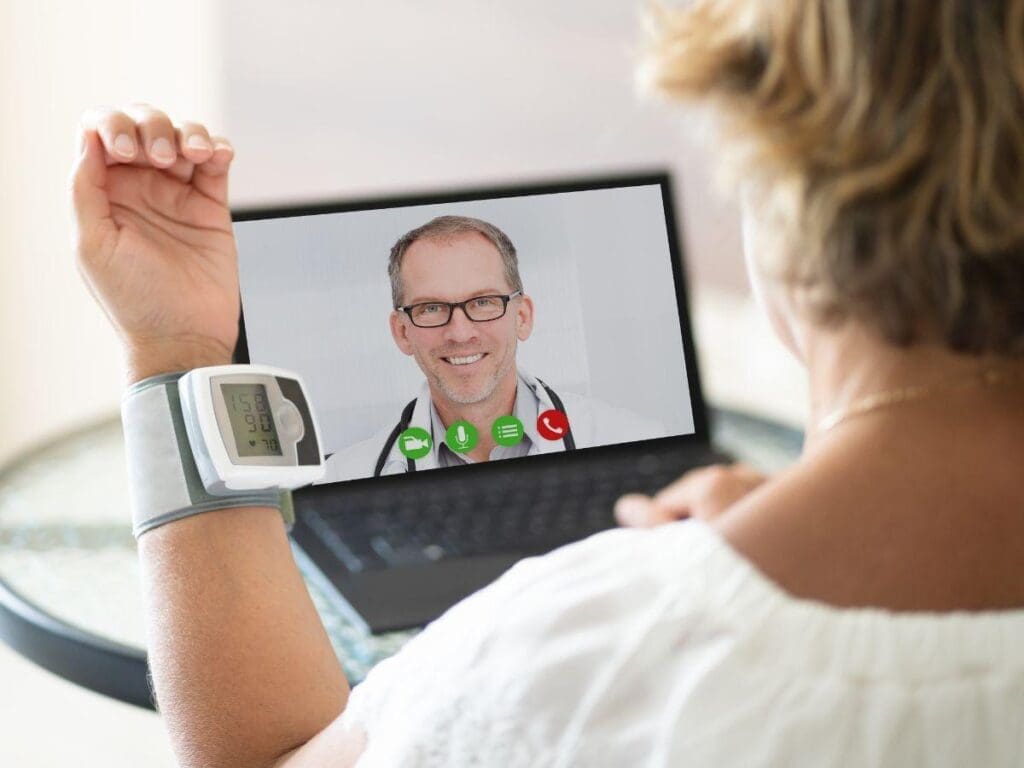Interested in losing weight?
Click the button to get started!
Key Takeaways:
- Telehealth is revolutionizing weight loss in 2025 with convenient access to GLP-1 medications, personalized treatment plans, and behavioral obesity treatments, making it easier for people with obesity to achieve their health goals from home.
- By eliminating geographic and economic barriers, telehealth ensures equitable access to weight loss solutions, offering comprehensive care that addresses both physical and mental health needs.
- With tools like virtual consultations, activity tracking, and expert-guided interventions, telehealth empowers you to manage your weight effectively. Start your journey with Trava Health today for a healthier, more confident you.
Telehealth for weight loss is gaining momentum as a go-to solution in 2025, driven by its convenience and effectiveness.
Advancements in telehealth platforms have made it easier for patients to access medical care, including GLP-1 medications and behavioral obesity treatments, without in-person visits.
Equitable access to telehealth services is addressing health inequities, making weight loss support available to more people, including those managing chronic diseases like cardiovascular disease and obesity.
Below, we'll explore why telehealth weight loss programs are becoming increasingly popular and highlight their benefits for people with obesity striving to achieve sustainable health goals.
Why People Are Choosing Telehealth for Weight Loss in 2025
Telehealth has transformed how patients approach weight loss, making it a preferred choice in 2025.
Telehealth platforms connect patients with primary care physicians and telehealth providers for virtual consultations and personalized weight loss management.
Through telehealth visits, patients can access person care and receive guidance on treatments like GLP-1 medications, behavioral obesity treatments, and other weight-loss interventions—all from the comfort of their homes.
The rise of telehealth is largely due to its convenience.
Telehealth visits eliminate the need for in-person appointments, saving time and reducing barriers for patients with busy schedules or limited mobility.
Recent technological advancements like remote lab testing and integrated telehealth services make monitoring and treatment more efficient and accessible.
Telehealth also addresses health inequities by bridging the digital divide and promoting equitable access.
Patients in remote areas or underserved communities benefit from comprehensive access to medical providers and tools for managing obesity, chronic disease, and cardiovascular health.
Telehealth’s flexibility and inclusivity continue to drive its popularity.

Advancements In Medical Care and Medications
Advancements in medical care and medications are driving the effectiveness of telehealth weight loss programs.
GLP-1 medications, including GLP-1 agonists and receptor agonists, have become essential tools in treating obesity.
These weight loss drugs, including semaglutide and tirzepatide, regulate appetite and blood sugar, helping people with obesity achieve significant weight loss.
Compounded GLP-1 injections and oral medication kits offer flexibility, ensuring more patients can access these treatments tailored to their needs.
Telehealth platforms make managing medications like GLP-1 treatment seamless.
Telehealth providers prescribe, monitor, and adjust these weight-loss drugs through virtual consultations, ensuring patient safety and optimal results.
Primary care doctors are crucial in overseeing treatment plans and collaborating with patients to manage chronic conditions remotely.
For patients managing chronic diseases like cardiovascular disease, heart disease, or high blood pressure, telehealth weight loss programs offer dual benefits.
By addressing excess weight and improving blood pressure and blood sugar levels, these programs enhance weight loss outcomes and overall health, making telehealth an indispensable resource.
The Convenience of Telehealth for Weight Loss
The convenience of telehealth for weight loss has made it a game-changer for patients seeking effective and accessible solutions.
By eliminating geographic and transportation barriers, telehealth platforms ensure that obese adults and patients in remote areas can access medical care without needing in-person visits.
This approach also reduces costs, making telehealth a more affordable option compared to traditional healthcare models, which can carry higher economic impacts due to travel and time constraints.
Telehealth provides comprehensive access to essential services in one platform, including behavioral obesity treatments, mental health services, and personal care.
These programs integrate physical and mental health support, offering patients a holistic approach to managing obesity and chronic disease.
With tools like behavioral therapy and mental health interventions, patients can address underlying factors that impact their health goals.
Studies and systematic reviews consistently highlight improved patient satisfaction with telehealth weight loss programs.
Patients report higher convenience levels and better outcomes, showcasing telehealth’s effectiveness in addressing physical and emotional aspects of care.

Innovations and Trends Driving Telehealth in 2025
As telehealth continues to evolve, innovations and trends in 2025 are reshaping how healthcare is delivered, particularly in weight loss management.
Advanced telehealth platforms now incorporate digital tools and virtual patient access, ensuring essential site functionality for a seamless user experience.
Features like integrated lab testing, activity tracking, and video consultations make managing weight loss and chronic disease more accessible and efficient.
Partnerships between telehealth providers and pharmaceutical companies drive greater accessibility to weight loss drugs like GLP-1 medications.
These collaborations streamline the availability of GLP-1 agonists and compounded GLP-1 injections, helping patients manage excess weight and improve clinical outcomes.
By leveraging these medications through telehealth, patients benefit from personalized care without needing in-person visits.
Telehealth is also shaping the broader healthcare ecosystem.
Organizations like Kaiser Permanente Institute for Health Policy emphasize telehealth’s role in addressing health inequities and promoting equitable access.
Its potential to revolutionize chronic disease management, improve patient outcomes, and redefine the future of healthcare is unmatched.
Get Started With Telehealth for Weight Loss
With telehealth becoming a leading choice for weight loss in 2025, it's clear why more people are turning to these programs.
Telehealth offers convenient access to GLP-1 medications, behavioral obesity treatments, and personalized care through advanced platforms.
By addressing barriers like geography and cost, telehealth ensures equitable access to weight loss solutions for people with obesity and chronic diseases.
To get started, finding the right telehealth provider is key.
Look for a provider specializing in GLP-1 treatment and comprehensive services like mental health support and behavioral interventions.
Ensure they offer tools like virtual consultations, lab testing, and seamless telehealth visits to effectively manage your weight loss journey.
Now is the time to take control of your health.
Explore Trava Health’s telehealth weight loss programs and take their free assessment today.
A healthier weight and a better quality of life are just a click away.
People Also Ask
What is the future of telehealth?
The future of telehealth is focused on expanding access to care, integrating advanced technologies like AI, and improving patient outcomes through personalized treatment plans and equitable access for all.
Is telehealth becoming more popular?
Yes, telehealth is becoming more popular as it offers convenient access to healthcare providers, eliminates the need for in-person visits, and provides effective solutions for managing chronic diseases like obesity.
What has increased the demand for telehealth?
The demand for telehealth has increased due to technological advancements, the need for accessible healthcare during the COVID-19 pandemic, and growing awareness of its convenience and effectiveness in addressing health inequities.
Can you get weight loss medication by telehealth?
Yes, you can get weight loss medication by telehealth. Telehealth providers prescribe and monitor medications like GLP-1 treatments through virtual consultations, ensuring personalized care and safety.
Interested in losing weight?
Click the button to get started!

